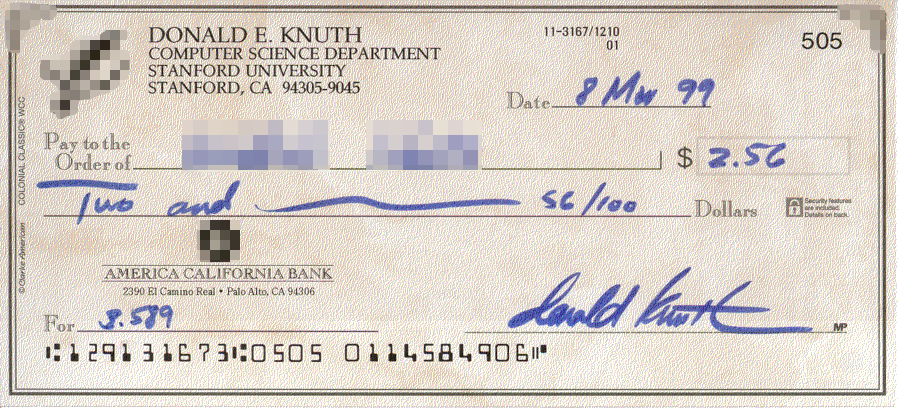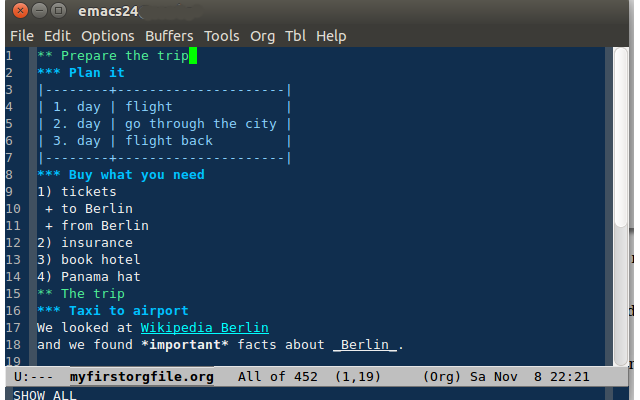|
Leo (text Editor)
Leo (Leonine Editor with Outlines) is an open-source text editor/outliner that features clones (virtual copies of outline nodes) as a central tool of organization, navigation, customization and scripting. Languages Leo can manipulate text or code in any human or computer programming language (e.g., Python, C, C++, Java), as Leo is a language-independent or "adaptable LPE" (literate programming environment). Table 2: "Some Adaptable LPEs", p. 113. Same authors' abridged version in book form: Table 2: "Some Language Independent LPEs", p. 251 Syntax highlighting is provided for many different programming languages. Leo is written in Python and can be extended with plugins written in Python. The GUI uses the Qt toolkit; the syntax-aware editor is based on Scintilla. Leo outlines are stored as XML files. Trees, clones and views Leo's foremost functionality, in addition to text editing, is that of an outliner, with a "vast range of convenience features for structuring and managing o ... [...More Info...] [...Related Items...] OR: [Wikipedia] [Google] [Baidu] |
Python (programming Language)
Python is a high-level, general-purpose programming language. Its design philosophy emphasizes code readability with the use of significant indentation. Python is dynamically-typed and garbage-collected. It supports multiple programming paradigms, including structured (particularly procedural), object-oriented and functional programming. It is often described as a "batteries included" language due to its comprehensive standard library. Guido van Rossum began working on Python in the late 1980s as a successor to the ABC programming language and first released it in 1991 as Python 0.9.0. Python 2.0 was released in 2000 and introduced new features such as list comprehensions, cycle-detecting garbage collection, reference counting, and Unicode support. Python 3.0, released in 2008, was a major revision that is not completely backward-compatible with earlier versions. Python 2 was discontinued with version 2.7.18 in 2020. Python consistently ran ... [...More Info...] [...Related Items...] OR: [Wikipedia] [Google] [Baidu] |
Donald Knuth
Donald Ervin Knuth ( ; born January 10, 1938) is an American computer scientist, mathematician, and professor emeritus at Stanford University. He is the 1974 recipient of the ACM Turing Award, informally considered the Nobel Prize of computer science. Knuth has been called the "father of the analysis of algorithms". He is the author of the multi-volume work '' The Art of Computer Programming'' and contributed to the development of the rigorous analysis of the computational complexity of algorithms and systematized formal mathematical techniques for it. In the process, he also popularized the asymptotic notation. In addition to fundamental contributions in several branches of theoretical computer science, Knuth is the creator of the TeX computer typesetting system, the related METAFONT font definition language and rendering system, and the Computer Modern family of typefaces. As a writer and scholar, Knuth created the WEB and CWEB computer programming systems designed to ... [...More Info...] [...Related Items...] OR: [Wikipedia] [Google] [Baidu] |
Software That Uses Qt
Software consists of computer programs that instruct the execution of a computer. Software also includes design documents and specifications. The history of software is closely tied to the development of digital computers in the mid-20th century. Early programs were written in the machine language specific to the hardware. The introduction of high-level programming languages in 1958 allowed for more human-readable instructions, making software development easier and more portable across different computer architectures. Software in a programming language is run through a compiler or interpreter to execute on the architecture's hardware. Over time, software has become complex, owing to developments in networking, operating systems, and databases. Software can generally be categorized into two main types: # operating systems, which manage hardware resources and provide services for applications # application software, which performs specific tasks for users The rise of cloud ... [...More Info...] [...Related Items...] OR: [Wikipedia] [Google] [Baidu] |
Code Navigation Tools
In communications and information processing, code is a system of rules to convert information—such as a letter, word, sound, image, or gesture—into another form, sometimes shortened or secret, for communication through a communication channel or storage in a storage medium. An early example is an invention of language, which enabled a person, through speech, to communicate what they thought, saw, heard, or felt to others. But speech limits the range of communication to the distance a voice can carry and limits the audience to those present when the speech is uttered. The invention of writing, which converted spoken language into visual symbols, extended the range of communication across space and time. The process of encoding converts information from a source into symbols for communication or storage. Decoding is the reverse process, converting code symbols back into a form that the recipient understands, such as English or/and Spanish. One reason for coding is to enab ... [...More Info...] [...Related Items...] OR: [Wikipedia] [Google] [Baidu] |
Free Text Editors
Free may refer to: Concept * Freedom, having the ability to do something, without having to obey anyone/anything * Freethought, a position that beliefs should be formed only on the basis of logic, reason, and empiricism * Emancipate, to procure political rights, as for a disenfranchised group * Free will, control exercised by rational agents over their actions and decisions * Free of charge, also known as gratis. See Gratis vs libre. Computing * Free (programming), a function that releases dynamically allocated memory for reuse * Free format, a file format which can be used without restrictions * Free software, software usable and distributable with few restrictions and no payment * Freeware, a broader class of software available at no cost Mathematics * Free object ** Free abelian group ** Free algebra ** Free group ** Free module ** Free semigroup * Free variable People * Free (surname) * Free (rapper) (born 1968), or Free Marie, American rapper and media pers ... [...More Info...] [...Related Items...] OR: [Wikipedia] [Google] [Baidu] |
Literate Programming
Literate programming is a programming paradigm introduced in 1984 by Donald Knuth in which a computer program is given as an explanation of its logic in a natural language, such as English, interspersed (embedded) with snippets of macros and traditional source code, from which compilable source code can be generated. The approach is used in scientific computing and in data science routinely for reproducible research and open access purposes. Literate programming tools are used by millions of programmers today. The literate programming paradigm, as conceived by Donald Knuth, represents a move away from writing computer programs in the manner and order imposed by the computer, and instead gives programmers macros to develop programs in the order demanded by the logic and flow of their thoughts. Literate programs are written as an exposition of logic in more natural language in which macros are used to hide abstractions and traditional source code, more like the text of an essa ... [...More Info...] [...Related Items...] OR: [Wikipedia] [Google] [Baidu] |
Outliners
An outliner (or outline processor) is a specialized type of text editor (word processor) used to create and edit outlines, which are text files which have a tree structure, for organization. Textual information is contained in discrete sections called "nodes", which are arranged according to their topic–subtopic (parent–child) relationships, like the members of a family tree. When loaded into an outliner, an outline may be collapsed or expanded to display as few or as many levels as desired. Outliners are used for storing and retrieving textual information, with terms, phrases, sentences, or paragraphs attached to a tree. So rather than being arranged by document, information is arranged by topic or content. An outline in an outliner may contain as many topics as desired. This eliminates the need to have separate documents, as outlines easily include other outlines just by adding to the tree. The main difference between a hand-written outline and a digital one is that the ... [...More Info...] [...Related Items...] OR: [Wikipedia] [Google] [Baidu] |
Slashdot
''Slashdot'' (sometimes abbreviated as ''/.'') is a social news website that originally advertised itself as "News for Nerds. Stuff that Matters". It features news stories concerning science, technology, and politics that are submitted and evaluated by site users and editors. Each story has a comments section attached to it where users can add online comments. The website was founded in 1997 by Hope College students Rob Malda, also known as "CmdrTaco", and classmate Jeff Bates, also known as "Hemos". In 2012, they sold it to DHI Group, Inc. (i.e., Dice Holdings International, which created the Dice.com website for tech job seekers). In January 2016, BIZX acquired both slashdot.org and SourceForge. In December 2019, BIZX rebranded to Slashdot Media. Summaries of stories and hyperlinks to news articles are submitted by Slashdot's own users, and each story becomes the topic of a threaded discussion among users. Discussion is moderated by a user-based moderation system. Randomly ... [...More Info...] [...Related Items...] OR: [Wikipedia] [Google] [Baidu] |
Noweb
Noweb, stylised in lowercase as noweb, is a literate programming tool, created in 1989–1999 by Norman Ramsey, and designed to be simple, easily extensible and language independent. As in WEB and CWEB, the main components of Noweb are two programs: "''notangle''", which extracts 'machine' source code from the source texts, and "''noweave''", which produces nicely-formatted printable documentation. Noweb supports TeX, LaTeX, HTML, and troff back ends and works with any programming language. Besides simplicity this is the main advantage over WEB, which needs different versions to support programming languages other than Pascal. (Thus the necessity of CWEB, which supports C and similar languages.) Noweb's input A Noweb input text contains program source code interleaved with documentation. It consists of so-called ''chunks'' that are either ''documentation chunks'' or ''code chunks''. A documentation chunk begins with a line that starts with an at sign (@) followed by a spac ... [...More Info...] [...Related Items...] OR: [Wikipedia] [Google] [Baidu] |
Markup Language
Markup language refers to a text-encoding system consisting of a set of symbols inserted in a text document to control its structure, formatting, or the relationship between its parts. Markup is often used to control the display of the document or to enrich its content to facilitating automated processing. A markup language is a set of rules governing what markup information may be included in a document and how it is combined with the content of the document in a way to facilitate use by humans and computer programs. The idea and terminology evolved from the "marking up" of paper manuscripts (i.e., the revision instructions by editors), which is traditionally written with a red pen or blue pencil on authors' manuscripts. Older markup languages, which typically focus on typography and presentation, include troff, TeX, and LaTeX. Scribe and most modern markup languages, for example XML, identify document components (for example headings, paragraphs, and tables), with t ... [...More Info...] [...Related Items...] OR: [Wikipedia] [Google] [Baidu] |
Iterators
In computer programming, an iterator is an object that enables a programmer to traverse a container, particularly lists. Various types of iterators are often provided via a container's interface. Though the interface and semantics of a given iterator are fixed, iterators are often implemented in terms of the structures underlying a container implementation and are often tightly coupled to the container to enable the operational semantics of the iterator. An iterator performs traversal and also gives access to data elements in a container, but does not itself perform iteration (i.e., not without some significant liberty taken with that concept or with trivial use of the terminology). An iterator is behaviorally similar to a database cursor. Iterators date to the CLU programming language in 1974. Description Internal Iterators Internal iterators are higher order functions (often taking anonymous functions, but not necessarily) such as map(), reduce() etc., implementing the trav ... [...More Info...] [...Related Items...] OR: [Wikipedia] [Google] [Baidu] |



